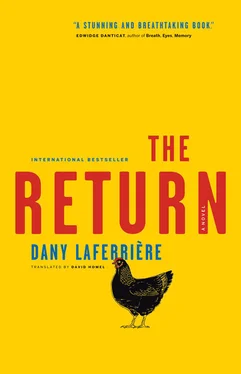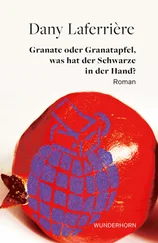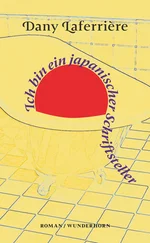keeps her from thinking about the larger one.
My sister comes back from work.
Everyone wants something from her.
She escapes by disappearing into the bathroom
with a magazine.
We hear her turning the pages.
The family waits for her to come out
so they can devour her whole.
This insatiable appetite for attention.
I go out on the gallery to be with my mother. Her universe, so dreary at first sight, is actually very rich. She knows the two birds that meet here every afternoon, at the same time. She has named the lizards after her dead brothers and sisters: Jean, Yves, Gilberte, Raymonde, Borno, André. Dead or in exile. That way I can remember their names. Otherwise I forget a name, then the face that goes with it. That’s how you lose a part of your life. She even has a name for the wind, this gentle breeze that comes to rock her to sleep when it’s time for her nap. If you’re quiet, a new world appears. Little things take on life. Sometimes she is eager to join them. Other times her anger with life is so strong she refuses that illusion. She will stay in her room for a week. Finally, she comes out, and all those things are there, waiting for her return, patient as always. She tells me they don’t show themselves unless they feel our despair.
The Death of Benazir Bhutto
The death of Benazir Bhutto comes to me while I am in the bathroom. The final spasms of on-and-off diarrhea. From another room, I hear the high-pitched voice of BBC’s female correspondent in Pakistan repeating the name Benazir Bhutto. In general, when someone speaks the name of a public personality more than three times in a sentence, that person has just died and the death was violent. Before the journalist’s commentary comes to an end, I hear a series of explosions. Screaming. Sirens. A terrible uproar. I can’t move because my diarrhea has returned with a vengeance. The noise of the crowd covers the journalist’s voice. I imagine at that very moment, all around the world, people are feeling the same sense of surprise, though no death was more predictable than hers.
It’s strange that the Middle East
in a certain way gives the impression
that the dice aren’t always loaded in politics.
People still risk their lives there.
All that anyone risks losing here
is their reputation.
What moves me
in this story of bloodshed
is the return of Benazir Bhutto
for her funeral,
to her native village of Larkana.
We always return in the end.
Dead or alive.
The wooden chamber.
Benazir, who wanted
to run a vast and populous country,
must feel cramped in there.
And very alone in that room
though it was made to measure.
We’re born somewhere.
If we can
we take to the road.
See the world, as they say.
Spend years out there sometimes.
But, in the end, we return to our point of departure.
Coming back to the hotel, I pass five kids straddling a low wall under a mango tree. They are playing cowboys and Indians. Four decades ago I was one of the Indians. We would rush down the hill, brandishing our tomahawks. The cowboys were waiting for us, hiding behind their stagecoaches. At the last moment they would shoot us down in full stride, like birds. One afternoon, I refused to show myself in plain sight like a fool, since the Indians knew the terrain better than the cowboys, and there was no reason why they wouldn’t use their experience. I was immediately made a cowboy. An Indian who protests becomes a cowboy. I understood there and then that being a cowboy or an Indian simply depends on how the guy organizing the game feels. Or who is telling the story. There’s no use complaining about the role we’re given; we just have to take the one we want. These little frustrations, accumulated over the years, end up erupting one day in bloody revolt.
A friend stopped by unannounced,
and we talked all evening.
That’s quite a change from life up North
where everything is arranged by phone.
If we eliminate all surprise from life
we strip it of all interest too.
And die without realizing it.
I seem to think
everything is good here
and everything is bad back there.
It’s just the swing of the pendulum.
For there was a time
when I hated everything about this place.
Men can’t hide anything
for long.
Observe them
and they will strip naked before you.
A cocktail of sex and power
and soon they’re dead drunk.
I’m holed up in my room, fascinated by the documentary I already saw once with my nephew. It’s running twenty-four hours a day on a local channel. Besides the violence, what makes the story successful is its clarity. Dazzling sunlight, dusty streets and two brothers ready to cut each other’s throats for the love of a woman. A real western. At last death has found an esthetic form.
Bare-chested, wearing jeans.
Gun in hand.
Close-up on Tupac.
The young prince of Cité Soleil.
His carnivore’s laugh must arouse
the girls as they watch
cloistered in their wealthy manors
high on the mountainside.
Rarely does a local legend
get us interested
in faces
and not just landscapes.
Here come the final images.
The music that tells you the end is near.
Death at the end of the day that will turn
these young men into heroes of the Cité.
The story takes me back to the beginnings of this country
when our heroes went barefoot
in the golden dust of twilight.
In the distance I hear that irresistible music.
I picture people drinking,
flirting, dancing and laughing.
Who could imagine that not far from the party
a man lying on his back
is seeking out his path through the Milky Way?
At fifty-six, three-quarters of the
people we’ve known are dead.
The half-century is a difficult border
to cross in a country like this.
They move so quickly toward death
that there’s no sense speaking of life expectancy.
It should be death expectancy instead.
If the bullet goes wide.
If even hunger spares you.
Disease won’t miss its mark.
All three together if you are
the chosen of those perverse jesting gods
who grimace in the darkness.
In my early evening sleep
I wonder where that sports car is going
at full throttle through the darkness.
The triumphant roar continues as far as the wall
of the blind alley.
If my ears serve me well
a wealthy young man has just met
that implacable god his father’s
money could never buy off.
I am here watching
what I have seen before,
even without having seen it,
and dwelling on what I already know.
A strange sense of immobility
in the midst of my feverish activity.
Is this what the cat feels
just before it leaps?
The Ex-Revolutionary in His Buick 57
An old doctor, a former minister of Public Works I met at a gallery opening, invited me to his house in Kenscoff, on the heights of Pétionville. We have been driving through the darkness for a while now. A well-maintained Buick 57 is the Rolls-Royce of the Caribbean. I am Gérard of the Gang of Four, he says, turning in my direction. I was a very close friend of your father’s. My blank look reminds him I don’t know much about my father’s life. And he is not at all surprised. The four of us were inseparable: your father, obviously, Jacques. . I’ve heard of him. Of course, he says, sad suddenly, he was the best one of all of us. My mother liked him. He was Marie’s friend, but your mother kept an eye on me. Why is that? Since I had a lot of girlfriends, she thought I’d introduce one of them to her husband, but Windsor had his own stable. And the fourth was François. Is he dead too? No. He’s holed up in the countryside. That guy was so brilliant and now he’s some kind of peasant. There are times when I don’t understand this country, as if we all had a suicidal virus. We just can’t seem to enter modernity. You think you know a guy because you’ve seen him every day for years and suddenly he announces he has to return to the shadows because a household god is demanding his presence there. Is that what happened with François? I don’t know if it was some kind of voodoo business, but in his case, what a waste! Where does he live? The last time I came across him, it was in Artibonite. He was involved in growing rice. I was on my way to Cap-Haïtien when I saw a peasant up to his waist in water. I told my driver to stop. The peasant was François. And to think the guy could have been minister of Agriculture in any government. I did everything in my power to bring him back to Port-au-Prince, you can imagine, the guy loved Brecht and Genet, but to each his own path. Monsieur François is in Croix-des-Bouquets now, the chauffeur says. I know, the ex-minister replies with a note of irritation, I’ve been told he’s raising chickens. The Buick 57 speeds through the night. The chauffeur seems to know every pothole in the pavement. He avoids them with such dexterity it’s like driving on a perfectly paved road.
Читать дальше












